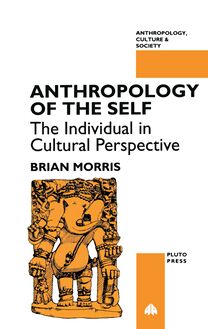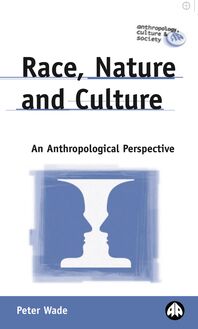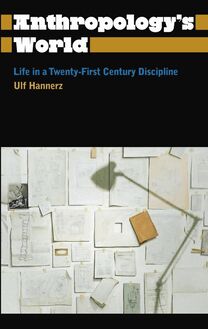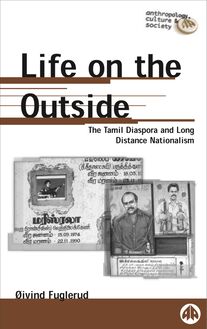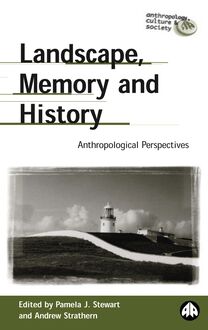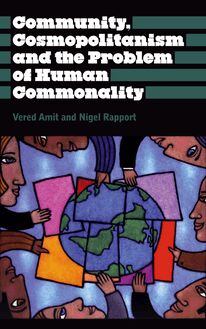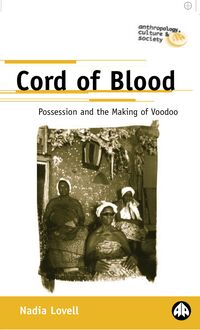-
 Univers
Univers
-
 Ebooks
Ebooks
-
 Livres audio
Livres audio
-
 Presse
Presse
-
 Podcasts
Podcasts
-
 BD
BD
-
 Documents
Documents
-
- Cours
- Révisions
- Ressources pédagogiques
- Sciences de l’éducation
- Manuels scolaires
- Langues
- Travaux de classe
- Annales de BEP
- Etudes supérieures
- Maternelle et primaire
- Fiches de lecture
- Orientation scolaire
- Méthodologie
- Corrigés de devoir
- Annales d’examens et concours
- Annales du bac
- Annales du brevet
- Rapports de stage
La lecture à portée de main
265 pages
English
Découvre YouScribe en t'inscrivant gratuitement
Je m'inscrisDécouvre YouScribe en t'inscrivant gratuitement
Je m'inscris
Obtenez un accès à la bibliothèque pour le consulter en ligne
En savoir plus
En savoir plus
265 pages
English
Obtenez un accès à la bibliothèque pour le consulter en ligne
En savoir plus
En savoir plus

Description
This is a thoroughly updated and revised edition of a popular classic of modern anthropology. The authors provide summaries of 'Enlightenment', 'Romantic' and 'Victorian' anthropology, from the cultural theories of Morgan and Taylor to the often neglected contributions of German scholars. The ambiguous relationship between anthropology and national cultures is also considered.
The book provides an unparalleled account of theoretical developments in anthropology from the 1920s to the present, including functionalism, structuralism, hermeneutics, neo-Marxism and discourse analysis. There are brief biographies of major anthropologists and coverage of key debates including totemism, kinship and globalisation.
This essential text on anthropology is highly engaging, authoritative and suitable for students at all levels.
Series preface
Preface
1. Proto-Anthropology
Introduction
Herodotus and other Greeks
After Antiquity
The European Conquests and their Impact
Why All This is not Quite Anthropology Yet
The Enlightenment
Romanticism
2. Victorians, Germans and a Frenchman
Introduction
Evolutionism and Cultural History
Morgan
Marx
Bastian and the German Tradition
Tylor and Other Victorians
The Golden Bough and the Torres Expedition
German Diffusionism
The New Sociology
Durkheim
Weber
3. Four Founding Fathers
Introduction
The Founding Fathers and their Projects
Malinowski and the Trobriand Islanders
Radcliffe-Brown's Natural Science of Society
Boas and Historical Particularism
Mauss and the Total Social Prestation
Anthropology in 1930: Parallels and Divergences
4. Expansion and Institutionalisation
Introduction
A Marginal Discipline?
Oxford and LSE, Columbia and Chicago
The Dakar-Djibouti Expedition
Culture and Personality
Cultural History
Ethnolinguistics
The Chicago School
'Kinshipology'
Functionalism's Last Stand
Some British Outsiders
5. Forms of Change
Introduction
Neo-evolutionism and Cultural Ecology
Formalism and Substativism
Methodological Individualists at Cambridge
Role Analysis and System Theory
6. The Power of Symbols
Introduction
From Function to Meaning
Ethnoscience and Symbolic Anthropology
Geertz and Schneider
Levi-Strauss and Structuralism
Early Impact
The State of the Art in 1968
7. Questioning Authority
Introduction
The Return of Marx
Structural Marxism
The Not-Quite-Marxists
Political Economy and the Capitalist World System
Feminism and the Birth of Reflexive Fieldwork
Ethnicity
Practice Theory
The Sociobiology Debate and Samoa
8. The End of Modernism?
Introduction
The End of Modernism?
The Postcolonial World
A New Departure or a Return to Boas?
Other Positions
9. Global Networks
Introduction
Towards an International Anthropology?
Trends for the Future
Biology and Culture
Globalisation and the Production of Locality
Bibliography
Index
The book provides an unparalleled account of theoretical developments in anthropology from the 1920s to the present, including functionalism, structuralism, hermeneutics, neo-Marxism and discourse analysis. There are brief biographies of major anthropologists and coverage of key debates including totemism, kinship and globalisation.
This essential text on anthropology is highly engaging, authoritative and suitable for students at all levels.
Series preface
Preface
1. Proto-Anthropology
Introduction
Herodotus and other Greeks
After Antiquity
The European Conquests and their Impact
Why All This is not Quite Anthropology Yet
The Enlightenment
Romanticism
2. Victorians, Germans and a Frenchman
Introduction
Evolutionism and Cultural History
Morgan
Marx
Bastian and the German Tradition
Tylor and Other Victorians
The Golden Bough and the Torres Expedition
German Diffusionism
The New Sociology
Durkheim
Weber
3. Four Founding Fathers
Introduction
The Founding Fathers and their Projects
Malinowski and the Trobriand Islanders
Radcliffe-Brown's Natural Science of Society
Boas and Historical Particularism
Mauss and the Total Social Prestation
Anthropology in 1930: Parallels and Divergences
4. Expansion and Institutionalisation
Introduction
A Marginal Discipline?
Oxford and LSE, Columbia and Chicago
The Dakar-Djibouti Expedition
Culture and Personality
Cultural History
Ethnolinguistics
The Chicago School
'Kinshipology'
Functionalism's Last Stand
Some British Outsiders
5. Forms of Change
Introduction
Neo-evolutionism and Cultural Ecology
Formalism and Substativism
Methodological Individualists at Cambridge
Role Analysis and System Theory
6. The Power of Symbols
Introduction
From Function to Meaning
Ethnoscience and Symbolic Anthropology
Geertz and Schneider
Levi-Strauss and Structuralism
Early Impact
The State of the Art in 1968
7. Questioning Authority
Introduction
The Return of Marx
Structural Marxism
The Not-Quite-Marxists
Political Economy and the Capitalist World System
Feminism and the Birth of Reflexive Fieldwork
Ethnicity
Practice Theory
The Sociobiology Debate and Samoa
8. The End of Modernism?
Introduction
The End of Modernism?
The Postcolonial World
A New Departure or a Return to Boas?
Other Positions
9. Global Networks
Introduction
Towards an International Anthropology?
Trends for the Future
Biology and Culture
Globalisation and the Production of Locality
Bibliography
Index
Sujets
Informations
| Publié par | Pluto Press |
| Date de parution | 10 mai 2013 |
| Nombre de lectures | 0 |
| EAN13 | 9781849649186 |
| Langue | English |
| Poids de l'ouvrage | 4 Mo |
Informations légales : prix de location à la page 0,6250€. Cette information est donnée uniquement à titre indicatif conformément à la législation en vigueur.
Extrait
A History of Anthropology
Anthropology, Culture and Society
Series Editors: Professor Vered Amit, Concordia University and Dr Jon P. Mitchell, University of Sussex
Published titles include:
Claiming Individuality: The Cultural Politics of Distinction EDITEDBYVEREDAMITANDNOELDYCK
Community, Cosmopolitanism and the Problem of Human Commonality VEREDAMITANDNIGELRAPPORT
Home Spaces, Street Styles: Contesting Power and Identity in a South African City LESLIEJ. BANK
In Foreign Fields: The Politics and Experiences of Transnational Sport Migration THOMASF. CARTER
On the Game: Women and Sex Work SOPHIEDAY
Slave of Allah: Zacarias Moussaoui vs the USA KATHERINEC. DONAHUE
A World of Insecurity: Anthropological Perspectives on Human Security EDITEDBYTHOMASERIKSEN, ELLENBALANDOSCARSALEMINK
A History of Anthropology THOMASHYLLANDERIKSENANDFINNSIVERTNIELSEN
Ethnicity and Nationalism: Anthropological Perspectives Third Edition THOMASHYLLANDERIKSEN
Globalisation: Studies in Anthropology EDITEDBYTHOMASHYLLANDERIKSEN
Small Places, Large Issues: An Introduction to Social and Cultural Anthropology Third Edition THOMASHYLLANDERIKSEN
What Is Anthropology? THOMASHYLLANDERIKSEN
Discordant Development: Global Capitalism and the Struggle for Connection in Bangladesh KATYGARDNER
Anthropology, Development and the PostModern Challenge KATYGARDNERANDDAVIDLEWIS
Border Watch: Cultures of Immigration, Detention and Control ALEXANDRAHALL
Corruption: Anthropological Perspectives EDITEDBYDIETERHALLERANDCRISSHORE
Anthropology’s World: Life in a TwentyFirst Century Discipline ULFHANNERZ
Humans and Other Animals Crosscultural Perspectives on Human–Animal Interactions SAMANTHAHURN
Culture and WellBeing: Anthropological Approaches to Freedom and Political Ethics EDITEDBYALBERTOCORSÍNJIMÉNEZ
State Formation: Anthropological Perspectives EDITEDBYCHRISTIANKROHN HANSENANDKNUTG. NUSTAD
Cultures of Fear: A Critical Reader EDITEDBYULILINKEANDDANIELLETAANASMITH
Fair Trade and a Global Commodity: Coffee in Costa Rica PETERLUETCHFORD
The Will of the Many: How the Alterglobalisation Movement is Changing the Face of Democracy MARIANNEMAECKELBERGH
The Aid Effect: Giving and Governing in International Development EDITEDBYDAVIDMOSSEANDDAVIDLEWIS
Cultivating Development: An Ethnography of Aid Policy and Practice DAVIDMOSSE
Contesting Publics Feminism, Activism, Ethnography LYNNEPHILLIPSANDSALLYCOLE
Terror and Violence: Imagination and the Unimaginable EDITEDBYANDREWSTRATHERN, PAMELAJ. STEWARTANDNEILL. WHITEHEAD
Anthropology, Art and Cultural Production MARUŠKASVAŠEK
Race and Ethnicity in Latin America Second Edition PETERWADE
Race and Sex in Latin America PETERWADE
The Capability of Places: Methods for Modelling Community Response to Intrusion and Change SANDRAWALLMAN
Anthropology at the Dawn of the Cold War: The Influence of Foundations, McCarthyism and the CIA EDITEDBYDUSTINM. WAX
Learning Politics from Sivaram: The Life and Death of a Revolutionary Tamil Journalist in Sri Lanka MARKP. WHITAKER
A HISTORY OF ANTHROPOLOGY
Second Edition
Thomas Hylland Eriksen and Finn Sivert Nielsen
First published 2001 by Pluto Press. Second edition published 2013 345 Archway Road, London N6 5AA
www.plutobooks.com
Distributed in the United States of America exclusively by Palgrave Macmillan, a division of St. Martin’s Press LLC, 175 Fifth Avenue, New York, NY 10010
Copyright © Thomas Hylland Eriksen and Finn Sivert Nielsen 2001, 2013
The right of Thomas Hylland Eriksen and Finn Sivert Nielsen to be identified as the authors of this work has been asserted by them in accordance with the Copyright, Designs and Patents Act 1988.
British Library Cataloguing in Publication Data A catalogue record for this book is available from the British Library
ISBN 978 0 7453 3353 3 Hardback ISBN 978 0 7453 3352 6 Paperback ISBN 978 1 8496 4918 6 PDF eBook ISBN 978 1 8496 4920 9 Kindle eBook ISBN 978 1 8496 4919 3 EPUB eBook
Library of Congress Cataloging in Publication Data applied for
This book is printed on paper suitable for recycling and made from fully managed and sustained forest sources. Logging, pulping and manufacturing processes are expected to conform to the environmental standards of the country of origin.
10
9
8
7
6
5
4
3
2
1
Typeset from disk by Stanford DTP Services, Northampton, England Simultaneously printed digitally by CPI Antony Rowe, Chippenham, UK and Edwards Bros in the United States of America
Contents
Series PrefacePreface to the Second EditionPreface to the First Edition
1.ProtoAnthropologyHerodotus and other Greeks 1; After Antiquity 3; The European conquests and their impact 6; Why all this is not quite anthropology yet 10; The Enlightenment 11; Romanticism 15
2.Victorians, Germans and a FrenchmanEvolutionism and cultural history 21; Morgan 23; Marx 25; Bastian and the German tradition 27; Tylor and other Victorians 29;The Golden Boughand the Torres expedition 32; German diffusionism 35; The new sociology 38; Durkheim 39; Weber 41
3.Four Founding FathersThe founding fathers and their projects 49; Malinowski among the Trobriand Islanders 52; RadcliffeBrown and the ‘natural science of society’ 55; Boas and historical particularism 58; Mauss and the total social prestation 61; Anthropology in 1930: parallels and divergences 64
4.Expansion and InstitutionalisationA marginal discipline? 69; Oxford and the LSE, Columbia and Chicago 72; The DakarDjibouti expedition 74; Culture and personality 77; Cultural history 80; Ethnolinguistics 82; The Chicago school 83; ‘Kinshipology’ 86; Functionalism’s last stand 90; Some British outsiders 92
5.Forms of ChangeNeoevolutionism and cultural ecology 99; Formalism and substantivism 104; The Manchester school 107; Methodological individualists at Cambridge 112; Role analysis and system theory 117
6.The Power of SymbolsFrom function to meaning 121; Ethnoscience and symbolic anthropology 125; Geertz and Schneider 127; LéviStrauss and structuralism 130; Early impact 133; The state of the art in 1968 135
vii viii ix
1
2
0
4
6
6
8
9
6
120
viHISTORY OF ANTHROPOLOGY A
7.Questioning Authority 138 The return of Marx 139; Structural Marxism 141; The notquite Marxists 145; Political economy and the capitalist world system 147; Feminism and the birth of reflexive fieldwork 151; Ethnicity 155; Practice theory 158; The sociobiology debate and Samoa 161
8.The End of Modernism?The end of modernism? 171; The postcolonial world 176; A new departure or a return to Boas? 179; Other positions 184
9.Global NetworksTowards an international anthropology? 194; Trends for the future 200; Biology and culture 203; Globalisation and the production of locality 211
BibliographyIndex
166
192
221 239
Series Preface
Anthropology is a discipline based upon indepth ethnographic works that deal with wider theoretical issues in the context of particular, local conditions – to paraphrase an important volume from the series:large issuesexplored insmall places. This series has a particular mission: to publish work that moves away from an oldstyle descriptive ethnography that is strongly areastudies oriented, and offer genuine theoretical arguments that are of interest to a much wider readership, but which are nevertheless located and grounded in solid ethnographic research. If anthropology is to argue itself a place in the contemporary intellectual world, then it must surely be through such research. We start from the question: ‘What can this ethnographic material tell us about the bigger theoretical issues that concern the social sciences?’ rather than ‘What can these theoretical ideas tell us about the ethnographic context?’ Put this way round, such work becomes about large issues,set in(relatively) small place, rather than a detailed description of a small place for its own sake. As Clifford Geertz once said, ‘Anthropologists don’t study villages; they study invillages.’ By place, we mean not only geographical locale, but also other types of ‘place’ – within political, economic, religious or other social systems. We therefore publish work based on ethnography within political and religious movements, occupational or class groups, among youth, development agencies, and nationalist movements; but also work that is more thematically based – on kinship, landscape, the state, violence, corruption, the self. The series publishes four kinds of volume: ethnographic monographs; comparative texts; edited collections; and shorter, polemical essays. We publish work from all traditions of anthropology, and all parts of the world, which combines theoretical debate with empirical evidence to demonstrate anthropology’s unique position in contemporary scholarship and the contemporary world.
vii
Professor Vered Amit Dr Jon P. Mitchell
Preface to the Second Edition
It would not be correct to claim that anthropology has changed dramatically in the twelve years that have passed since the publication of the first edition of this book. However, there are several reasons why we felt that a thorough revision and update was in order by now. First, the nonmetropolitan anthropologies – from Brazil to Russia, from Japan to India – were treated cursorily and somewhat superficially in the first edition. This has now, at least to the best of our abilities, been rectified. Recent scholarship on ‘other people’s anthropologies’ has been of great help here. Second, there were a number of small errors, inaccuracies and ambiguities scattered around in the first edition. We cannot guarantee that they are all gone, but again, we have done our best. Third, there have in fact been some slight changes or adjustments in the course that anthropology has been taking in the last few years. For example, the field of globalisation studies, an incipient and slightly naughty trend in the 1990s – naughty because it eschewed an assumed orthodoxy seeing anthropology as the study of small, fairly isolated societies – has grown into maturity. Few anthropolo gists today see problems in studying the relationship between the global and the local, and most do, in one way or another. Fourth, as a matter of fact, the early chapters have been revised and modified just as much as the latter ones. Indeed it may be said that the remote past has changed just as rapidly as the recent past. Partly we see the past in a different light because of recent changes; partly new research and a deepened understanding reveals new details and formerly ignored patterns. It is not true, in other words, that the past is safe and immune to change since what has happened has happened. As anthropolo gists interested in history have shown time and again, the past is something malleable and dynamic. Each generation has its own past. This is our anthropological past.
viii
Thomas Hylland Eriksen Finn Sivert Nielsen Oslo, November 2012
Preface to the First Edition
This is an ambitious book, but not a pretentious one. It is ambitious in that it tries, within the space of relatively few pages, to make sense of the diverse history of anthropology. Our priorities, omissions and interpretations are bound to be contested, since there can be no single authoritative history of anything, least of all a sprawling, dynamic and disputed field like anthropology. Still, the book is unpretentious, since our aim throughout has been to offer a sober and balanced account of the historical growth of anthropology as a discipline, not to propose a radical reinterpretation of it. There exists a growing scholarly literature on the history of anthropology, which this textbook does not try to compete with. Nevertheless, we know of no existing book with exactly the same scope as this one. The scholarly literature is often specialised, and existing textbooks on anthropological history are either more theoretically oriented or more committed to one or a few professional traditions. Although we may not always have succeeded, we have strived to give an impression of the parallel, convergent and interdependent developments of all major traditions in social and cultural anthropology. The book is chronologically ordered. Beginning with the ‘proto anthropologies’ from ancient Greece to the Enlightenment, it continues with the creation of academic anthropology and the growth of classical sociology during the nineteenth century. The third chapter concentrates on the four men who, by general consensus, are considered the founding fathers of twentiethcentury anthropology, and the fourth chapter indicates how their work was continued, and diversified, by their students. The fifth and sixth chapters both deal with the same period – from about 1946 to about 1968, but concentrate on different trends: Chapter 5 discusses the theoretical controversies surrounding concepts of society and social integration, while Chapter 6 covers concepts of culture and symbolic meaning. In Chapter 7, the intellectual and political upheavals of the 1960s and 1970s are presented, with emphasis on the impulses emanating from Marxism and feminism. Chapter 8 deals with the 1980s, concentrating on the postmodernist movement and its close cousin, postcolonialism, two critical trends, which seriously
ix
-
 Univers
Univers
-
 Ebooks
Ebooks
-
 Livres audio
Livres audio
-
 Presse
Presse
-
 Podcasts
Podcasts
-
 BD
BD
-
 Documents
Documents
-
Jeunesse
-
Littérature
-
Ressources professionnelles
-
Santé et bien-être
-
Savoirs
-
Education
-
Loisirs et hobbies
-
Art, musique et cinéma
-
Actualité et débat de société
-
Jeunesse
-
Littérature
-
Ressources professionnelles
-
Santé et bien-être
-
Savoirs
-
Education
-
Loisirs et hobbies
-
Art, musique et cinéma
-
Actualité et débat de société
-
Actualités
-
Lifestyle
-
Presse jeunesse
-
Presse professionnelle
-
Pratique
-
Presse sportive
-
Presse internationale
-
Culture & Médias
-
Action et Aventures
-
Science-fiction et Fantasy
-
Société
-
Jeunesse
-
Littérature
-
Ressources professionnelles
-
Santé et bien-être
-
Savoirs
-
Education
-
Loisirs et hobbies
-
Art, musique et cinéma
-
Actualité et débat de société
- Cours
- Révisions
- Ressources pédagogiques
- Sciences de l’éducation
- Manuels scolaires
- Langues
- Travaux de classe
- Annales de BEP
- Etudes supérieures
- Maternelle et primaire
- Fiches de lecture
- Orientation scolaire
- Méthodologie
- Corrigés de devoir
- Annales d’examens et concours
- Annales du bac
- Annales du brevet
- Rapports de stage
Signaler un problème
YouScribe
Le catalogue
Le service
© 2010-2024 YouScribe
